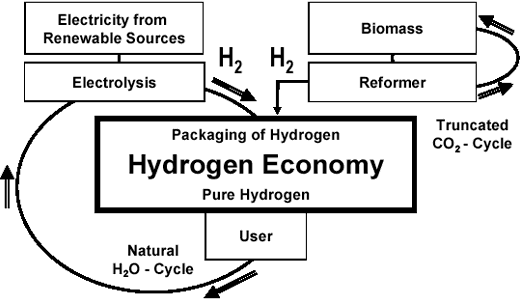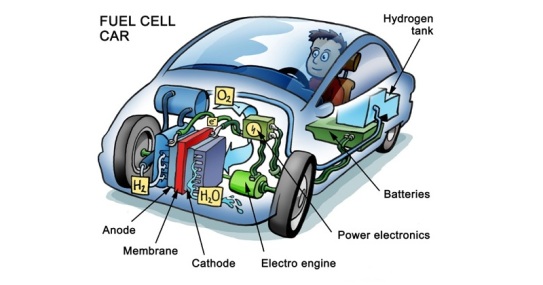Is this the real life? Is this just fantasy?
Ever since the Industrial Revolution, climate change has been this imminent impending doom that certain governments of the world agree on while certain others deny its very existence. Certain countries like the United Kingdom are aware of it and are working quite hard to reduce their carbon footprint. Denmark also is aiming to avoid fossil fuels and move to a system completely sustained only by renewables. Here arises the question,
“ Will this be possible to achieve on a larger, world-wide scale?”.

So What does Hydrogen Economy mean?
Hydrogen Economy refers to this proposed system of using Hydrogen to generate sufficient energy to satisfy the energy needs and requirements of a particular region, state or a nation. Hydrogen Economy suggests the use of energy delivered by Hydrogen in all fields, from cars, bikes and automobiles to satiating the energy needs of buildings from domestic houses and apartments to skyscrapers and sports stadiums and arenas.
With the recent advances in the field of Nuclear Fusion reactors with Tokamak Energy achieving First Plasma production with its ST40 reactor in the United Kingdom this May 1st, Hydrogen Economy is so close to becoming a reality. Scientifically, this is a breakthrough of sorts, which may lead to successful power production through Nuclear Fusion, not just in the UK but also in developing countries like India and Brazil.
Apart from Nuclear Fusion, power can be produced from hydrogen through fuel cells. Iceland and Amsterdam have made use of the fuel cell technology for fishing and ferry boats. The Toyota Mirai is an exemplary masterstroke in the Japanese Auto Market which runs on power from fuel cells. This could very well be a start in bringing about renewable energy sources at comparably lower costs but the technology has its own drawbacks. The cost of manufacturing a fuel cell is very high that the companies that manufacture these cells are forced to sell them at lower profits. Reports suggest that as of January 2014, two years after the worldwide revenue of the fuel cell market hit the one billion mark, no public company in the industry had seen profit. Such a bummer, right? To add to the misery, Samsung decided to drop out of the fuel cell business last year “as the outlook of the market isn’t good”.
Dennis Weaver, who piloted a hydrogen-powered car from coast to coast, proclaimed:
“If we had a hydrogen economy worldwide, every nation on earth could create its own energy source to support its economy, and the threat of war over diminishing resources would just evaporate.”

Hydrogen Economy is usually pitched as this revolutionary fantasy perhaps ideally put to use in this Utopian world of Laser guns and Lightsabers but dismissed as a pipe dream in real life. Why? In this capitalistic world we live in, Profit is the only thing that brings about change.
Is the Hydrogen Economy profitable?
As the name suggests, Hydrogen Economy is based on the very first element in the periodic table, Hydrogen. The source of trouble for all pre-Mendeleevian (I really did make this word up) scientists looking to arrange the then known elements in a particular order, Hydrogen is also a huge source of trouble regarding its place in our economy. It sure does have the potential to heavily impact the Global Energy Market that is currently built only around coal and fossil fuels, but the impact should be positive and should push us on the path of further development and not be regressive.
The production of Hydrogen on a scale suitable for use in a perfectly ideal Hydrogen Economy can be achieved in two ways. Number one, from fossil fuels through steam- methane reforming techniques, a process that pollutes the environment so much that it defeats the purpose of a Hydrogen Economy. Number two, through electrolysis from water. This process only gives out oxygen and no pollutants but on the downside, the cost of mass production is so very high that the production companies cannot even dream of a profit and that they would have to operate at heavy losses, which is something no human being with basic education would do, let alone business strategists in costly suits.
Batteries and Fuel Cells are only for powering automobiles and boats and submarines but to power an entire city through Hydrogen, Nuclear Fusion is the only possible way. Nuclear Fusion, now at its nascent stages, is very costly to build and maintain and it uses hydrogen produced from Natural Gas and Methane derivatives. In the near future, if Nuclear Fusion tastes success, we might have to move to more eco-friendly methods of producing Hydrogen.
How would the society react to a Hydrogen Economy?
Feasibility issues aside, Hydrogen Economy would face other issues like Monopoly in the Energy industry leading to high fluctuating energy prices set by the organization that leads the energy market. Anyone in possession of the rights to Nuclear Fusion Reactor technology would raise the price of electricity to increase their own personal wealth. In the case of competition with them, they would lower the price until the competition gets blown out of the water. Now we don’t want unprincipled monopolists masquerading as leaders of the energy industry to set our electricity bills, do we?

Today, Automation brings out job insecurities among millions. In the case of a Hydrogen Economy, millions of jobs in the energy sector would be lost, leading to large scale unemployment. Thousands of people would be made redundant as the great coal, oil, gas, uranium and renewable industries all disappear. Mines and drilling rigs would close, millions of truckers, train drivers and ship captains would all lose their jobs. And that is assuming the best possible scenario. Frightening, isn’t it.
The woes don’t end there. Hydrogen has one of the widest ignition mix range with air and that makes it a good fuel but an even better explosive. No one likes to work in such a hostile environment faced with the threat of the entire place blowing up at any time. Except Michael Bay of course. Hydrogen also burns in the ultraviolet range and hence, the flame of a hydrogen-oxygen fire is invisible to the human eye and can only be detected by a Flame detector, adding to the production costs. Phew. Too much pessimism.
To conclude, Hydrogen Economy can save us from environmental degradation in the near future and can “decarbonise” our world, but to think of it as a system that can sustain the entire world is like walking on thin ice, you could fall in anytime. An energy industry that moves away from the need to depend on non-renewable energy sources currently under depletion would sure be a gift but running it entirely on hydrogen is a steep uphill climb from where we are now. Though it has immense room for development in the years to come, a completely Hydrogen Economy is not something I would look forward to.
‘Hydrogen in the economy’ would rather be far more beneficial than a ‘hydrogen economy’ as such.
